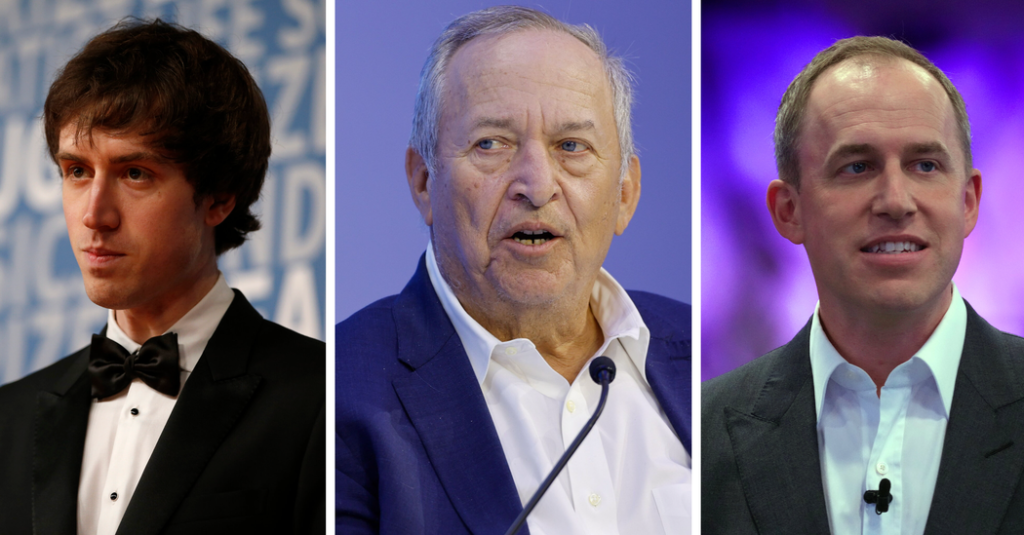What occurred at OpenAI over the previous 5 days could possibly be described in some ways: A juicy boardroom drama, a tug of battle over certainly one of America’s greatest start-ups, a conflict between those that need A.I. to progress quicker and people who wish to sluggish it down.
However it was, most significantly, a struggle between two dueling visions of synthetic intelligence.
In a single imaginative and prescient, A.I. is a transformative new instrument, the newest in a line of world-changing improvements that features the steam engine, electrical energy and the private pc, and that, if put to the proper makes use of, might usher in a brand new period of prosperity and make gobs of cash for the companies that harness its potential.
In one other imaginative and prescient, A.I. is one thing nearer to an alien life kind — a leviathan being summoned from the mathematical depths of neural networks — that have to be restrained and deployed with excessive warning as a way to forestall it from taking up and killing us all.
With the return of Sam Altman on Tuesday to OpenAI, the corporate whose board fired him as chief government final Friday, the battle between these two views seems to be over.
Staff Capitalism received. Staff Leviathan misplaced.
OpenAI’s new board will include three folks, a minimum of initially: Adam D’Angelo, the chief government of Quora (and the one holdover from the previous board); Bret Taylor, a former government at Fb and Salesforce; and Lawrence H. Summers, the previous Treasury secretary. The board is predicted to develop from there.
OpenAI’s largest investor, Microsoft, can be anticipated to have a bigger voice in OpenAI’s governance going ahead. That will embrace a board seat.
Gone from the board are three of the members who pushed for Mr. Altman’s ouster: Ilya Sutskever, OpenAI’s chief scientist (who has since recanted his choice); Helen Toner, a director of technique at Georgetown College’s Middle for Safety and Rising Know-how; and Tasha McCauley, an entrepreneur and researcher on the RAND Company.
Mr. Sutskever, Ms. Toner and Ms. McCauley are consultant of the varieties of people that have been closely concerned in fascinated with A.I. a decade in the past — an eclectic mixture of lecturers, Silicon Valley futurists and pc scientists. They seen the expertise with a mixture of concern and awe, and apprehensive about theoretical future occasions just like the “singularity,” a degree at which A.I. would outstrip our capability to include it. Many have been affiliated with philosophical teams just like the Efficient Altruists, a motion that makes use of information and rationality to make ethical choices, and have been persuaded to work in A.I. out of a want to attenuate the expertise’s harmful results.
This was the vibe round A.I. in 2015, when OpenAI was fashioned as a nonprofit, and it helps clarify why the group stored its convoluted governance construction — which gave the nonprofit board the power to regulate the corporate’s operations and change its management — even after it began a for-profit arm in 2019. On the time, defending A.I. from the forces of capitalism was seen by many within the business as a prime precedence, one which wanted to be enshrined in company bylaws and constitution paperwork.
However loads has modified since 2019. Highly effective A.I. is now not only a thought experiment — it exists inside actual merchandise, like ChatGPT, which can be utilized by tens of millions of individuals day by day. The world’s greatest tech corporations are racing to construct much more highly effective methods. And billions of {dollars} are being spent to construct and deploy A.I. inside companies, with the hope of decreasing labor prices and rising productiveness.
The brand new board members are the sorts of enterprise leaders you’d anticipate to supervise such a challenge. Mr. Taylor, the brand new board chair, is a seasoned Silicon Valley deal maker who led the sale of Twitter to Elon Musk final 12 months, when he was the chair of Twitter’s board. And Mr. Summers is the Ur-capitalist — a distinguished economist who has said that he believes technological change is “web good” for society.
There should be voices of warning on the reconstituted OpenAI board, or figures from the A.I. security motion. However they received’t have veto energy, or the power to successfully shut down the corporate immediately, the way in which the previous board did. And their preferences might be balanced alongside others’, akin to these of the corporate’s executives and buyers.
That’s a very good factor should you’re Microsoft, or any of the hundreds of different companies that depend on OpenAI’s expertise. Extra conventional governance means much less threat of a sudden explosion, or a change that will drive you to modify A.I. suppliers in a rush.
And maybe what occurred at OpenAI — a triumph of company pursuits over worries concerning the future — was inevitable, given A.I.’s rising significance. A expertise doubtlessly able to ushering in a Fourth Industrial Revolution was unlikely to be ruled over the long run by those that wished to sluggish it down — not when a lot cash was at stake.
There are nonetheless a number of traces of the previous attitudes within the A.I. business. Anthropic, a rival firm began by a bunch of former OpenAI staff, has set itself up as a public profit company, a authorized construction that’s meant to insulate it from market pressures. And an lively open-source A.I. motion has advocated that A.I. stay freed from company management.
However these are greatest seen because the final vestiges of the previous period of A.I., through which the folks constructing A.I. regarded the expertise with each surprise and terror, and sought to restrain its energy via organizational governance.
Now, the utopians are within the driver’s seat. Full pace forward.
